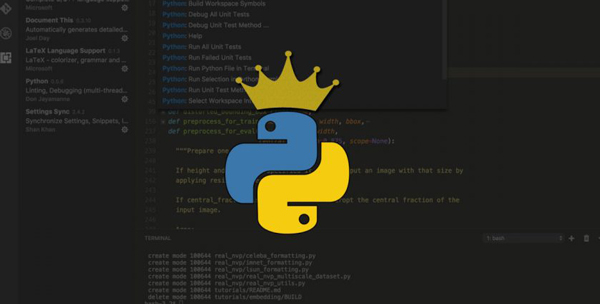10 interesting facts about Python programming language
There are many interesting things about Python that you should know if you are learning about this programming language. Some of them can be very helpful for you. And here are 10 interesting facts about Python that Quantrimang has compiled.

1. Why is it called 'Python'?
This is the first interesting fact about this language. Why is the name "Python" not any other name? In Vietnamese, Python means "python". So does the creator of the programming language link something to this animal? Or Python is named after the snake snake Python in Greek mythology?
The truth is simpler than you think. The father of Python - Guido Van Rossum said the name of the language was taken from the British comedy series "Monty Python's Flying Circus" and Rossum was a fan of the film. "Monty Python's Flying Circus" was broadcast on the BBC in the 1970s and it brought creators a comfortable, entertaining time during language development. Also, Van Rossum wants a brief and mysterious name, something that will attract everyone's attention. So 'Python' is born!

2. Python has passed French in elementary school
Does this sound hard to believe? Believe it or not, in 2015, Python passed French to become the most popular language taught in elementary schools. Statistics reveal that 6/10 parents like their children studying Python instead of French. This suggests that many people appreciate the importance of Python programming.
Similar to children, similar statistics show that 75% of elementary school children love to learn how to control a robot instead of learning French.
3. Python does not require a compiler
On the computer, python is a program that can read Python commands and execute them. This program is also called "Python interpreter" - a program capable of handling Python language. Interpreter in Vietnamese means "interpreter", "pine / interpreter". Python interpreter will translate (run) each sentence, or each Python code, not wait for the coder to write down the whole paragraph and then arrange, re-edit and translate (compile - compile).
So Python is an interpreted language (with Ruby, PHP, Perl, Javascript, .) and not compiled languages like C, C ++, Golang, .
4. Python has C and Java variants
Despite being a standalone programming language, Python has variants for C and Java programming languages. The C variant is called CPython, a Java variant of Jython and designed to implement the Python programming language written in C, Java. One of the features of this variation is improved performance. Variations can act as interpreters and compilers at the same time.
5. Python is an open source language
Although Python has great popularity, Python is actually an open source language, you can freely use and distribute Python, even for commercial purposes. Unbound status makes Python a perfect tool for everyone to use. And because it is open source, you can not only use the software, the program is written in Python, but you can also change its source code. Python has a large community, constantly improving it every time it updates.
6. Python is one of the official languages at Google
Do you know Python is one of the official programming languages used at Google? This language is a basic and essential part of Google thanks to its efficiency and flexibility. Python is an easy-to-use language even when developing large and complex projects.
Google Search and YouTube are some products offered by Python. There are several APIs and Google libraries that are also developed based on Python programming.
7. Python is quite similar to English
Python is extremely simple and easy to learn but still very powerful, quite similar to popular English today. You can easily understand what code is describing and not encounter complex syntax. In general, Python code is very clear, easy to understand and flexible to type.
8. Python can be applied in many areas
You can build a lot of applications in many areas in Python. This language can be used for web development, mobile application development, AI, Machine learning, Big data and Internet of things.
9. Python does not support pointers
Unlike other programming languages, Python does not support pointers. Instead, the object is passed by reference.
10. Decompression function
This is another interesting fact about Python programming. You can easily extract a list of all the functions you have used.
See more:
- 11 tips for learning Python for 'newbie'
- Open source Python projects for beginners
- 5 choose the best Python IDE for you
- The world's 5 most annoying 'programming languages'